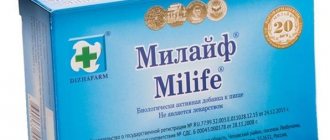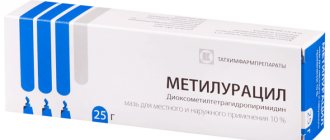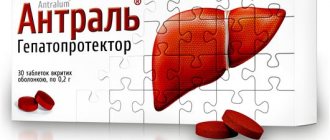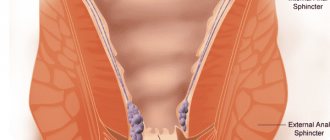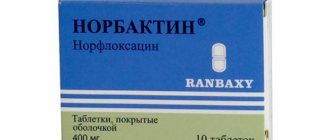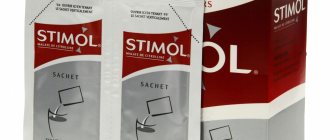Directions for use and doses
IV,
stream, in the “lying” position (slowly, at a maximum speed of 5 ml/min) or drip (short or long).
Patients with acute necrosis of the pancreas and effusion containing enzymes into the abdominal cavity - additionally intraperitoneal
.
The contents of 1 bottle are dissolved in 2 ml of isotonic sodium chloride solution.
The following dosage regimens are usually prescribed:
In acute pancreatitis:
intravenously
(slowly) - 200,000–300,000 ATRE (150376–225564 KIE), then within 24 hours
IV
(drip) - another 200,000–300,000 ATRE (150376–225564 KIE) of aprotinin. Treatment is carried out until the clinical picture of the disease and laboratory test results normalize.
Prevention of postoperative pancreatitis:
as an auxiliary treatment intravenously (slowly) - 200,000 ATRE (150,376 KIU) / day.
For the treatment of shock conditions:
intravenous
(slow) initial dose - 200,000-300,000 ATRE (150376-225564 KIU) of aprotinin, then - 140,000 ATRE (105,263 KIU) every 4 hours.
Prevention of fat embolism:
intravenous
(slow) initial dose - 200,000 ATRE (150,376 KIU) of aprotinin, then - daily
IV
slowly, 200,000 ATRE (150,376 KIU) of aprotinin (as an auxiliary treatment).
For bleeding:
The initial dose is 300,000 ATRE (225,564 KIE), subsequent doses are 140,000 ATRE (105,263 KIE) every 4 hours
IV
(slow).
For children, Contrikal ® is administered at a dose of 14,000 ATRE/kg/day.
special instructions
Before starting treatment, it is recommended to conduct a skin test to determine individual sensitivity to aprotinin. If there is a history of allergic reactions, before starting therapy with aprotinin, the use of glucocorticosteroids and histamine H1 receptor blockers is necessary.
In cases of DIC syndrome and hyperfibrinolysis, the use of aprotinin is permissible only after eliminating all manifestations of DIC syndrome and with the prophylactic effect of heparin.
The drug is prescribed with caution to patients who have been administered muscle relaxants over the previous 2-3 days.
Shelf life of the drug Contrikal ®
lyophilisate for preparing a solution for intravenous and intracavitary administration 10,000 ATRE - 3 years.
lyophilisate for the preparation of solution for intravenous administration 10,000 ATRE - 3 years. Solvent - 5 years.
Do not use after the expiration date stated on the package.
INSTRUCTIONS for medical use of the drug
Registration number:
Tradename:
Dosage form:
lyophilisate for preparing a solution for intravenous administration 10 thousand ATRE
Compound:
1 bottle contains: active substance: aprotinin (in the form of a concentrated solution) 10,000 ATRE (antitrypsin units); excipients: mannitol 10 mg, hydrochloric acid 1% qs (to adjust pH, maximum 0.3125 µl). 1 ampoule contains a solvent for the preparation of dosage forms for injection 0.9% (sodium chloride 18.00 mg, water for injection up to 2.0 ml).
Description : lyophilized powder of white or almost white color; solvent is a clear, colorless liquid.
Pharmacotherapeutic group:
ATX code : B02AB01
Pharmacological properties
Pharmacodynamics. Polyvalent protease inhibitor isolated from bovine lungs. It has antiproteolytic, antifibrinolytic and hemostatic effects. Inactivates the most important proteases (trypsin, chymotrypsin, kallikrein), which play an important role in pathophysiological processes. It inhibits both the total proteolytic activity and the activity of individual proteolytic enzymes. Aprotinin completely inactivates the proteolytic activity of plasmin and blocks the activation of plasminogen. The antiprotease activity of aprotinin determines its effectiveness in lesions of the pancreas and other conditions with a high content of kallikrein and other proteinases in plasma and tissues. Reduces the fibrinolytic activity of the blood, inhibits fibrinolysis and has a hemostatic effect in coagulopathies. Blockade of the kallikrein-kinin system allows it to be used for the prevention and treatment of various forms of shock.
Release form and composition
Contrical is produced in the form of a lyophilisate for the preparation of a solution for intracavitary and intravenous administration (in bottles, with a solvent in ampoules of 2 ml per set; in blister packs of 5 sets; in a cardboard pack, 2 packs).
1 bottle contains:
- Active ingredient: aprotinin – 10,000 antitrypsin units (ATre);
- Auxiliary component: mannitol.
Solvent: isotonic sodium chloride solution – 2 ml.
Mechanism of action of contrical
At its core, the drug kontrikal is a polyvalent chemical compound that has an inhibitory effect on protheliases of cells of the human body. Penetrating through the cell membrane, contrical has:
- counteracting protein degradation;
- restorative effect on fibrin fibers of tissues;
- normalizing effect on hemostasis and metabolic intracellular processes.
In pancreatic cells, the drug promotes the activation of various enzymes, such as trypsin, kallikrein. These substances prevent the death of pancreatic tissue, thus inhibiting the process of decay as a result of a massive inflammatory and lytic process.
The pharmacological ability of the active substance contrical to have a hemostatic effect is widely used. By reducing the level of platelet aggregation, contrical reduces the risk of developing coagulopathies and the development of thrombosis of various collateral great vessels. This allows the use of the drug contrical in the postoperative periods for the prevention of deep vein thrombosis.
Properties of Contrikal
Kontrikal is produced in Croatia by the medical corporation Pliva Hrvatska. This is an inhibitory drug that breaks down excess enzymes using protein molecules. In addition, the drug affects pancreatic enzymes (reduces their activity to moderate) and blood.
In general, all enzymes that are secreted by the digestive organs (namely the pancreas) are necessary for the normal digestive process, but sometimes there are too many of them. This happens precisely with pancreatitis, when an excess of these substances begins to “devour” the pancreas itself, which produces them.
It is in such cases that so-called antienzymes are prescribed - drugs that suppress the excessive activity of the pancreas.
Another important function of the drug Contrikal is its action as a hemostatic. Hemostatics are designed to prevent the breakdown of blood clots by the same enzymes; in this case, the process is called “fibrinolysis.”
Fibrinolysis breaks down blood clots, which can lead to internal bleeding. This occurs either due to a medical condition or when taking blood thinning medications. Contrikal is also prescribed here, which actively normalizes all processes in the blood.
The drug kontrikal - use for various conditions
The main purpose of the pharmacological drug kontrikal is to relieve the lytic effect of various congestion in the tissues of the pancreas. Contrical is used for:
- acute and chronic pancreatitis;
- necrosis of pancreatic tissue;
- surgical interventions in pancreatic tissue;
- carrying out functional diagnostics;
- operations on organs close to the pancreas.
Other indications for the use of Contrical are related to hemostatic properties and include:
- angioedema of soft tissues;
- postoperative and postpartum bleeding;
- severe menstrual irregularities, expressed in the form of heavy bleeding;
- prevention of the development of nonspecific mumps in acute form;
- shock conditions (collapse, pain shock, burn disease);
- complex combined injuries of the head and brain matter.
The drug is completely contraindicated during pregnancy and breastfeeding. Also, you should not use Contrical if you have a confirmed allergic reaction to cattle protein.
Side effects manifest themselves acutely in the form of systemic and local allergic reactions, disturbances in the functioning of the cardiovascular system, and disorders of the digestive processes.
The introduction of contrical is allowed only with the patient lying down. Initially, 50 thousand units of action are administered intravenously slowly. Then, with normal tolerability of the drug, the dose is gradually increased to 500 thousand units.
Compresses can be used to stop local external bleeding. To do this, a sterile gauze napkin is soaked in a solution with 200 - 300 thousand units of contricle and applied to the wound surface for 30 minutes.
The daily dosage for children is calculated according to the formula: 20 thousand units for each kilogram of the baby’s body weight. The dose may be divided into several intravenous infusions.
Effect of the drug
The active substance of the drug, together with enzymes, creates protein structures, inhibiting the former, after which they disintegrate. Such structures count with the following enzymes:
- chymotrypsin;
- plasmin;
- trypsin;
- kininogenase;
- kallikrein;
- plasmin.
Plasmin and kallikrein may cause bleeding. The same kallikrein, as well as trypsin and chymotrypsin, can damage the pancreas. Contrical actively fights the hyperactivity of these substances and is used for pathologies of the digestive system.
It is important to understand that the drug does not have the ability to prevent absolutely any bleeding. It is effective only in case of excessive fibrinolysis activity. The latter is a normal internal process in the body of any healthy person, as it breaks down blood clots.
But with its hyperactivity, even those blood clots that still remain useful are broken down, which is why internal bleeding occurs. This is often observed in women giving birth.
This process is also observed in patients with heart disease. These patients are prescribed blood thinners. In general, the effect of Contrikal is quite broad, and it can be used to normalize the functioning of almost any enzymes.
Does kontrikal come in tablets?
Separately, I would like to point out that Kontrikal does not come in tablets. Today, many manufacturers of dietary supplements attribute to them the properties that this drug has. But we want to warn you against using them. Apart from harm to the gastric mucosa, these substances will do nothing. Unfortunately, the active drug substance contrical is available to the cells of the human body only after direct administration into the bloodstream through intravenous infusions. All other methods lead to complete decomposition of aprotinin. When administered intramuscularly, this can lead to the development of a post-injection abscess. If ingested, acute gastritis may develop.
Drug interactions
The use of Contrical in combination with Reomacrodex mutually enhances their sensitizing effect.
Please note that aprotinin:
- Causes an increase in the clotting time of whole blood when added to heparinized blood;
- Depending on the dose used, it inhibits the action of alteplase, urokinase and streptokinase;
- It is a weak inhibitor of serum pseudocholinesterase, and therefore may enhance muscle relaxation and slow down the metabolism of suxamethonium chloride, and there is a risk of developing apnea.
Patient reviews of the drug kontrikal
The main reviews on Contrakal come from attending physicians. Patients often do not have the opportunity to objectively assess the effect of this drug. The reason for this is an extensive treatment regimen for a particular condition, which, in addition to Contrical, includes many other drugs.
According to doctors, kontrikal allows you to quickly relieve acute conditions. Particularly positive reviews of Kontrikal come from obstetricians, who, with the help of the drug, are able to quickly and risk-free stop postpartum hemorrhage. The drug has also proven itself to be excellent in the prevention of postpartum embolism with amniotic fluid.
Adverse reactions
The drug can cause a number of negative reactions in the body. These include skin itching, urticaria, redness, laryngeal edema, Quincke's edema, and anaphylactic shock.
In addition, hypotension, nausea, or even vomiting may occur. Sometimes patients experience confusion, hallucinations, or psychosis.
If, when using Contrikal for the first time, a person experiences any of these reactions, then the risk of a recurrence when resuming therapy increases by 5%.
Side effects of the drug Contrikal 10,000
When using aprotinin, hypersensitivity reactions of varying severity may develop. Rarely, a severe reaction can lead to anaphylactic shock. Repeated administration of aprotinin is especially dangerous. Although even with the first administration of aprotinin, patients may experience phenomena that are reminiscent of a hypersensitivity reaction to the drug. They are manifested by skin rashes, tachycardia, pallor, blue lips, shortness of breath, profuse sweating, heart rhythm disturbances with a feeling of anxiety, and nausea. With repeated administration, thrombophlebitis may develop at the injection site. If necessary, generally accepted measures are taken to eliminate these complications, for example, single or multiple intravenous administration of adrenaline at a dose of 0.05–0.1 mg, intravenous administration of prednisolone at a dose of 250–1000 mg, and a complete blood transfusion.
pharmachologic effect
Fibrinolysis inhibitor. Aprotinin, the active substance of the drug, is a polyvalent protease inhibitor. By forming reversible stoichiometric enzyme-inhibitor complexes, aprotinin inactivates the most important proteases of blood plasma, cellular elements and tissues, incl. plasmin, trypsin, chymotrypsin, kallikrein, which play an important role in the development of pathophysiological reactions. The therapeutic effect of aprotinin is primarily due to the suppression of the proteolytic effect of plasmin and the blockade of plasminogen activation by autogenous activators.
Aprotinin has a wide spectrum of inhibitory effects and therefore can be used not only as an antifibrinolytic, but also as a preventive and therapeutic agent for disorders of other enzyme systems.
The activity of aprotinin is expressed in kallikrein inactivating units (KIU), as well as in antitrypsin units (ATrE). 1 ATRE corresponds to 1.33 KIU.
Indications for use
- Pancreatitis (acute, exacerbation of chronic), pancreatic necrosis. Carrying out operations and diagnostic studies on the pancreas (prevention of the development of enzymatic autolysis of the pancreas during operations on it and nearby abdominal organs);
- Bleeding due to hyperfibrinolysis: postoperative (especially during operations on the lungs, prostate gland), post-traumatic, before, during and after childbirth (including amniotic fluid embolism), polymenorrhea;
- Shock (traumatic, toxic, hemorrhagic, burn);
- Angioedema;
- Deep and extensive traumatic tissue damage.
Contrical is used as an auxiliary therapy:
- Massive bleeding (during thrombolytic treatment);
- Coagulopathies characterized by secondary hyperfibrinolysis (in the initial phase, before the onset of effect after the use of heparin and replacement of coagulation factors);
- Extracorporeal circulation.
The drug is also prescribed for the prevention of acute nonspecific postoperative mumps, postoperative pulmonary embolism and bleeding, fat embolism in polytrauma, especially fractures of the skull and lower extremities.
Analogues and cost
There is a wide range of drugs that are equivalent to Contrikal. Analogues in ampoules are as follows:
- Aprotex;
- Vero-Narkal;
- Trasylol 500000;
- Ingiprol;
- Ingitril;
- Gordoks.
All six drugs are administered intravenously. There is also a drug called Aerus, which is used by inhalation.
Since the medicine is produced by only one manufacturer, there are no strong fluctuations in price. Changes can only be determined by the conditions of transportation, storage and trade markups.
The average price of Kontrikal in ampoules in Russia ranges from 570 rubles to 604 rubles per package of 10 ampoules of solvent and 10 ampoules of lyophilisate. For a set of 1 ampoule of solvent and 1 ampoule of lyophilisate you will need to pay approximately 61-75 rubles.
If one of the pharmacies sells Kontrikal at a very low price, it is not recommended to buy such a product: there is a risk of purchasing a fake.

